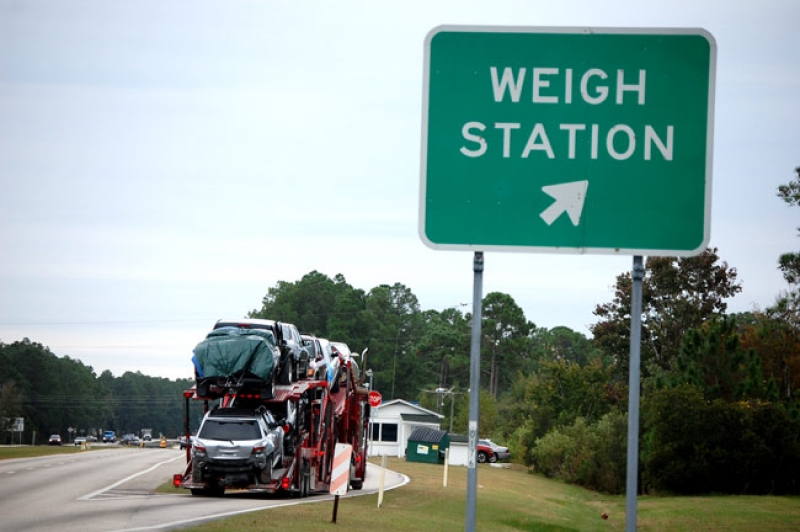
Some truck drivers may see weigh stations as an inconvenience that keeps them from reaching their destination in time during their travel, but these stops are incredibly necessary for many reasons.
A truck driver is responsible for many things, and that includes stopping at a weigh station during their travel to ensure that their vehicle is safe for the road, with several inspections. Unitruck offers aftermarket parts for Freightliner M2s, Volvos, Macks, and more, to get your semi-truck back to the level of safety it needs.
There are also serious consequences for trucks that fail to meet the standards in place, which is why truck drivers need to be well-versed in everything there is to know about weigh stations as part of the job. Continue reading for what you need to know about weigh stations.
What is a Weigh Station?
A weigh station is an area off the highway where truck drivers pull over to have their truck weighed and inspected. They’re referred to as a “port of entry” when they’re near a state border, but they can also be in the interior of a state, especially in an area where there’s a lot of freight movement.
Why Weigh Stations Are Necessary
Semi-trucks are notoriously massive vehicles that carry a ton of weight and, because of this, some roads, bridges, and overpasses might not be able to handle the weight. This can not only pose a threat to others on the road, but it can also lead to structural damage to the surface a truck travels on. Weigh stations used to collect taxes if a heavier truck passed through because of how much more harm it can cause the road.
Today, weigh stations are a way to make sure that semi-trucks are safe for the road ahead, with an inspection to ensure the U.S. Department of Transportation (DOT) guidelines are followed. Without weigh stations, the road’s various risks would be much higher for all drivers.
What Happens at a Weigh Station?
It used to be that weigh stations did just what the name implies; weigh semi-trucks. Now, the role of a weigh station is much broader. In addition to weighing trucks to make sure they’re under the legal limit, (the federal limit is 80,000 pounds) weigh stations may also check to make sure that drivers are in compliance with all FMCSA and DOT regulations. This includes checking for HOS violations, looking at freight paperwork, and checking for other safety violations related to the truck, similar to a standard DOT inspection.
When approaching a weigh station, the driver will first look to see if it’s open. There will be flashing lights or a sign saying if it is or not. If it’s open, the driver will get in the correct lane and pull over, either getting in line to be weighed or driving up to the scale if it’s open. Some scales are portable, and the driver can be weighed while driving, while others are stationary and require the driver to stop the truck. Once the driver has been weighed, they’ll either be waved off or signal lights will let them know that they’re subject to a further inspection.
Can I Bypass a Weigh Station?
If your carrier participates in a bypass solution like, PrePass or Drivewyze, then you may be able to. These are mounted devices that can be put in your cab to alert you when a weigh station is approaching and if you’re able to bypass it or not. Be aware, there are some types of loads, like oversized and hazmat that always need to be checked, no matter if you have a bypass device.
Get a free repair estimate today! Call us today at 407-334-7200.
What Happens to an Overweight Truck?
If you go through a weigh station and the truck doesn’t meet the legal requirements, there are a variety of consequences a driver may face. The punishment can differ in each state, but here is what a truck driver could potentially face:
- Fines – An overweight truck can lead to a major fine or a ton of small fees and is all based on the state you are in. The fine can fall anywhere between $100 to $10,000. The fine you receive can also be based on how many offenses you have had in the past, with second offenses potentially costing double or triple the amount of a fine. Some states will even charge you based on how much you are over the limit.
- Jail Time – The most severe punishment for driving an overweight truck could land you in jail with a sentence up to two months. If you are sentenced to jail time, states will also revoke a truck driver’s CDL license once legal proceedings take place.
A truck’s weight is a serious matter that a driver should be aware of when they are traveling. This is not just because it can cause harm to others, but also because of the expensive fines and potential prison time you could face.
While many drivers consider weigh stations a frustrating part of the job that adds time to their runs, they do serve a purpose. Weigh stations are meant to make sure that overweight trucks aren’t causing major damage to the country’s highways that could lead to major road maintenance, delays, and possible accidents. As long as drivers follow all posted signage and keep all their freight documents in the truck, they should be out of weigh stations and back on the road in no time.
To get more information about us, follow us on Facebook and Instagram. Or call us right now for a road service on: repairtrucktrailer.com
